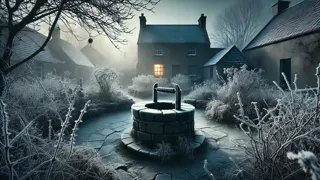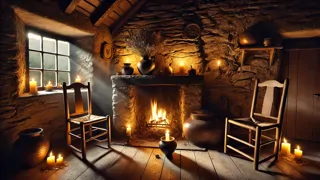Introduction
On a biting January evening, Aisling stepped off the late coach into the heart of Connemara, the wind tugging at her scarf as if urging her to remember. Ahead lay the narrow lane that led past low stone walls, pale cottages, and the old churchyard where generations of her family slumbered beneath Celtic crosses carved by hands now turned to dust. The sky above was a bowl of steel-gray clouds, and the Atlantic’s surf beyond the dunes murmured secrets she had half-forgotten—childhood laughter on summer mornings, her grandmother’s gentle hum as she tended the hearth, and a voice she once loved. As she walked toward the cottage where she was born, Aisling felt every step laden with years she’d fled and memories that refused to let go. The salt in the wind tasted like tears, and the faint glow of a single lantern in the window spoke of life inside, however fragile it might be. She paused at the threshold, hand on the latch, heart in her throat, and realized that coming home meant unlocking the past—in all its beauty and sorrow—and facing those she had lost to time.
Return to Connemara
Aisling crossed the low threshold of her grandmother’s cottage as the door creaked shut behind her. Inside, the air held the faint trace of peat smoke and damp wool—sensations she'd tried to banish in the city, but which now enveloped her like an old shawl. The fireplace lay cold, its stones mottled with ash long undisturbed. Picture frames, cracked with age, lined the mantel: a sepia portrait of a young woman with bright eyes; a faded photograph of a couple dancing in a barn, doors wide to the evening sky; a scrap of paper bearing spidery handwriting in Gaelic. Each held a story, a breath of the past she felt stirring at her fingertips. She paused before the largest frame—her mother and father standing beside her cradle, laughter in their eyes—then turned to the shelves heavy with books bound in emerald and russet, heavy with legend and prayer.

She traced a finger across a leather-bound volume of Gaelic ballads, recalling how her grandmother would sing by candlelight as the wind howled outside. The melody of “The Tangled Braid” rose in her mind, a lament for a lost love, and she found herself humming the tune before she realized it. The cottage floorboards sighed under her weight, and somewhere beyond the window a fox barked at midnight. Aisling closed her eyes, heart tightening, as the ghosts of her childhood stirred in every corner. The years in Dublin had taught her to dismiss superstition, but here, superstition was truth—the intangible presence of those gone on, waiting to guide her through corridors of grief.
Gathering courage, she lit a candle on the table. Its flame wavered, casting dancing shadows on hand-thrown pottery and wildflowers dried in a glass jar. Each shadow seemed an echo of someone she’d known. She set her travel bag by the bench and stepped outside into the chill. In the yard, the old well stood silent, ringed by thorny rosebushes browned by frost. She knelt to touch the iron ring, recalling how her grandmother would draw water at dawn, her breath a cloud in the air. A single heartbeat later, the sound of water—soft and clear—rose from the well as if whispered by memory itself. Aisling stepped back, startled, tears slipping down her cheeks. In that moment, the dead spoke and she felt them near, not as terror but as kin. A promise of reckoning, and of solace, lay in the hush between worlds.
Echoes in the Fog
Fog rolled in from the sea, draping the village in whispers. Aisling walked toward the abandoned pier, each footstep swallowed by swirling tendrils of white. Wooden planks, worn smooth by decades of tide and travelers, groaned under her weight. Lanterns that once guided fishing boats lay shattered, their iron frames rusted and silent. Long ago, sailors braved these dark waters; now only gulls and memories ventured this far. She remembered her grandmother’s stories: of a night when a lover never returned, lost to currents under a blood-red sky. Tonight, she felt the chill of that sorrow as if it were her own.

The mist thickened, and Aisling paused at the pier’s end, the Atlantic spread wide beyond her, black and infinite. In the fog’s hush, she heard footsteps—not hers—and turned to see a figure receding into the greyness. A pulse quickened in her chest: the ghost of Cormac, her childhood friend and first love, who had vanished one February night when the storm surge claimed his boat. She called out, voice trembling, and caught sight of him again—his coat soaked, face drawn, eyes haunted. She reached out, only for the figure to dissolve into fog. The wind carried a soft moan, like laughter and weeping entwined. Aisling drew her coat tighter around her, heart pounding, as she realized that the village had never truly let him go.
Rain began to spatter, cold fingers tapping on her shoulders. She raced inland, returning to the old schoolhouse where Cormac’s name still lingered in chalk on the blackboard. Inside, wooden desks sagged under the weight of dust; textbooks lay open, their pages yellowed with time. She knelt before a low window, tracing his initials carved into the sill. Just then, the window rapped once, as though tapped by a knuckle. Her breath caught. The room fell silent again, but on the sill lay a single daisy, fresh and white, its petals trembling. She recognized it: the very flower he tucked behind her ear the day they declared their love among the gorse bushes. Kneeling in the damp classroom, Aisling realized memory could bleed into the present, and that love—once given—could echo beyond the grave.
Embrace of the Departed
Back at the cottage, Aisling built a fire in the hearth, its glow an anchor against the night’s chill. The flame’s warmth coaxed her into reverie as she cradled a cup of tea steeped with wild heather. She placed two chairs before the dying embers: one for herself, the other empty. She imagined Cormac across from her, his knocks soft on the windowpane, and her grandmother in the corner, humming an old hymn. The wooden floor creaked as if they’d taken their seats.

She spoke their names aloud—soft pleadings to the air. “Cormac, tell me what you saw out there.” “Nanny, guide me home.” The house answered with the sigh of settling beams and the crackle of peat. Outside, the wind tuned itself to their voices, carrying them to distant headlands. In the hush that followed, she sensed a presence so near she could almost feel a hand on her shoulder.
During that silent communion, Aisling realized that love endures as memory, and memory blossoms into a kind of life beyond the body’s last breath. To remember was to keep the dead from slipping into oblivion. She wept quietly, tears blessing the hearth, each drop a prayer. When at last she rose from the chair she had set by the fire, the cottage felt full—warm with voices. Though the sea outside raged on, the room remained calm, a sanctuary where the living and the dead stood side by side. Aisling knew she would leave at dawn, returning to the city with grief and hope interwoven in her veins. But tonight, she belonged to the ones she loved—alive in memory, never truly gone.
Conclusion
At first light, Aisling stepped onto the dune path above the cottage, the sky a gentle wash of rose and slate. In her arms, she carried a small bundle wrapped in tartan cloth: a handful of daisies from Cormac’s classroom, sprigs of heather from the churchyard, and the first page of her grandmother’s Gaelic hymns. She placed the daisies in a pocket, heather in another, and tucked the hymn between the folds of her coat. Leaving the cottage behind, she followed the winding lane toward the sea, each step steady with purpose. The memories she carried were no longer burdens but lanterns against the coming dusk of life. At the cliff’s edge, she paused, the Atlantic breeze teasing her hair. A hush fell as if all the voices of the dead gathered to bid her farewell. She whispered a blessing, then opened her hands, letting petals and paper drift on the tide—an offering of remembrance and love. As the waves closed over them, Aisling felt something gentle lift in her chest: grief transformed into gratitude. With heart lightened and spirit steady, she turned from the water’s edge, carrying both loss and redemption in her bones—proof that life and death are bound by the fragile thread of memory.


















